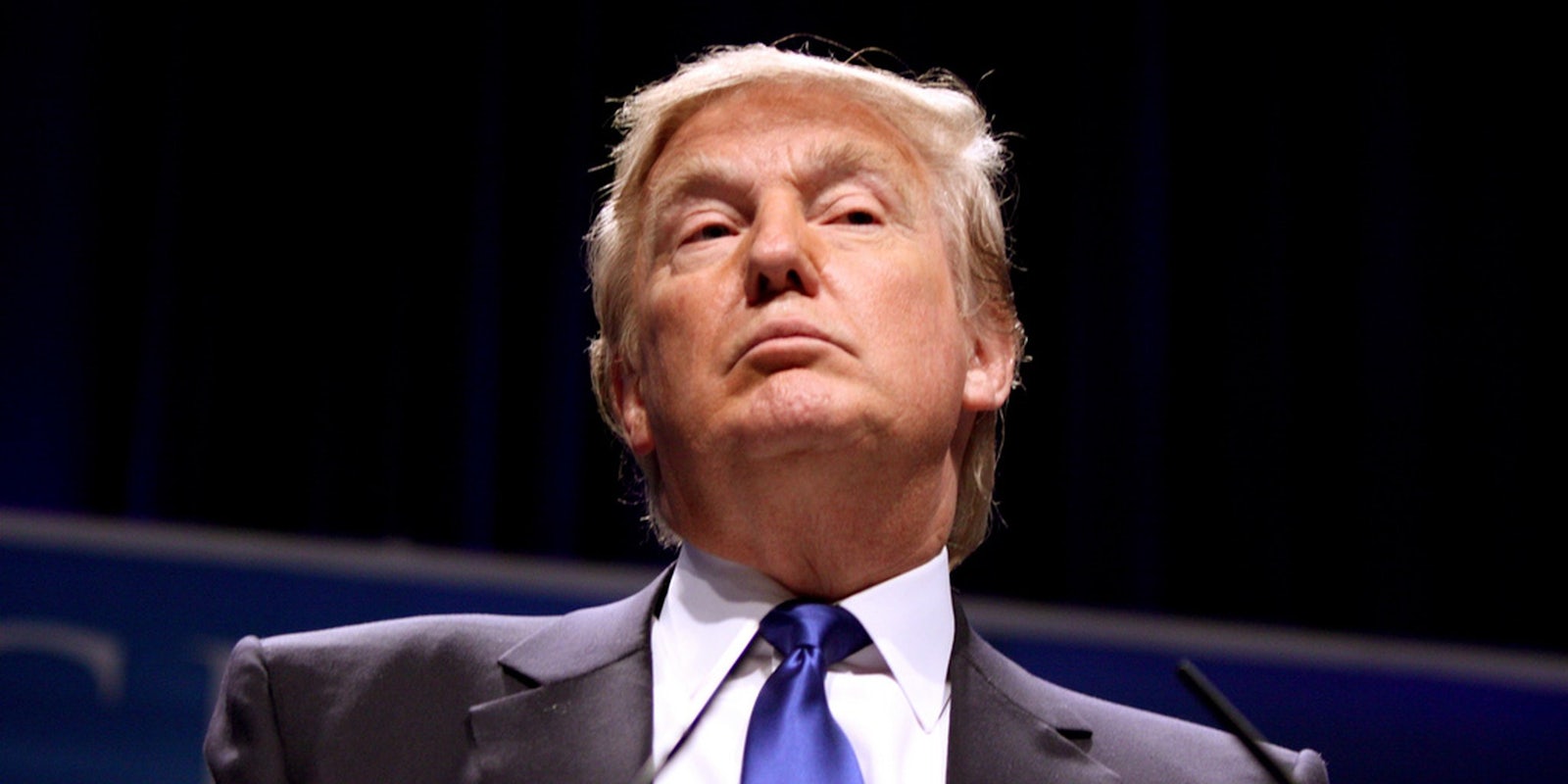Donald Trump tackled a vexing question of our age, arguing that his retweets are not endorsements, even as he suggested they are a model for foreign policy. Seriously.
In an appearance on Tuesday night at a CNN town hall that was, even by his standards, notably non-presidential, the Republican frontrunner offered insight into his thinking about his use of Twitter, the platform on which his presidential campaign rose and has arguably teetered.
Host Anderson Cooper asked Trump if he will make good on his suggestion that he will press charges against Michelle Fields, now former reporter for Breitbart News, for brushing him while asking him a question. Police in Jupiter, Fla., charged Trump’s campaign manager on Tuesday with battery for grabbing and pulling Fields away from Trump moments after she approached him after the March 8 press conference.
“You’ve suggested you might,” Cooper said.
“Excuse me,” Trump interrupted. “I didn’t suggest.”
“I tweeted,” he said.
‘I have 14 million people between Twitter and Facebook and Instagram, and I retweet things and we start dialogue and it’s very interesting.’ — Donald Trump
Trump has used Twitter impulsively but effectively to directly reach and mobilize millions of supporters, cutting out the media middleman but nevertheless earning a fortune in free media with tweets so controversial or ridiculous they are hard to ignore. The Washington Post called his tweeting “genius.”
But Trump’s distinction between suggesting and tweeting indicates he does not expect his 140-character musings to be taken so seriously.
In the same town hall, Trump defended his decision to retweet a posed image of his wife Melania, a former model, compared to an unflattering shot of Heidi Cruz, the wife of rival candidate Texas Sen. Ted Cruz. The retweet clearly meant to communicate that Trump’s wife is better looking than Cruz’s.
“@Don_Vito_08: “A picture is worth a thousand words” @realDonaldTrump #LyingTed #NeverCruz @MELANIATRUMP pic.twitter.com/5bvVEwMVF8“
— Donald J. Trump (@realDonaldTrump) March 24, 2016
Reminding millions of Americans of arguments with their siblings, Trump first asserted that “I didn’t start it.” He also suggested that retweeting a supporter does not mean he shares their view.
Trump has previously expounded on that idea. In February, he retweeted a backer’s false claim that Florida Sen. Marco Rubio, who since dropped out of the presidential race, is not eligible to become president because his parents were born in Cuba.
“@ResisTyr: Mr.Trump…BOTH Cruz AND Rubio are ineligible to be POTUS! It’s a SLAM DUNK CASE!! Check it! https://t.co/NjqWP0pP6X“
— Donald J. Trump (@realDonaldTrump) February 20, 2016
“Honestly, I’ve never looked at it,” Trump said when asked about his retweet. “Somebody said he’s not. And I retweeted it. I have 14 million people between Twitter and Facebook and Instagram, and I retweet things and we start dialogue and it’s very interesting.”
That is short of the standard of responsibility most lawmakers, ethicists and journalists, not to mention presidents, advocate for disseminating information.
“But why retweet—why retweet somebody?” Cooper pressed.
“I really would rather talk about nuclear proliferation,” Trump said.
“You act as if retweeting is not an endorsement,” Cooper countered.
Trump then offered a different justification. He said he repeats other people’s claims (and thus implicitly endorses them) to hit back against critics.
“I don’t let things go so easy,” he explained “And let me tell you something. I don’t let the—if I were running the country, I wouldn’t have people taking advantage of the United States in trade and in every other way, either.”
If you follow the logic, the Republican presidential frontrunner there cited his use of retweets as a model for American foreign policy.
“Believe me. I wouldn’t have China walking away with trade deficits of $505 billion a year,” Trump continued. “I wouldn’t have Mexico laughing at us how stupid we are with trade deals, and at the border. I wouldn’t let Japan get away what they’re doing with, you know, devaluation of the yen.”
If you follow the logic, the Republican presidential frontrunner there cited his use of retweets as a model for American foreign policy.
But minutes later, Trump took it back, sort of.
He noted that his wife faulted him for repeating a slur for female anatomy that a backer used to describe Cruz, prompting Cooper to ask: “What is it with you? Like, repeats and retweets don’t count?”
“Do you ever notice my biggest problems are repeats and retweets?” Trump asked.
“Maybe that’s one of those things you should learn from your behavior and not retweet things,” the CNN host suggested.
“You’re right,” Trump said. “That I agree with.”
Dan Friedman has worked as senior Washington correspondent for the New York Daily News and reported on the Senate and congressional oversight for National Journal. He started his reporting career in Boston. He is a graduate of the University of Pennsylvania and holds a Masters in International Relations from the London School of Economics. Follow him on Twitter @dfriedman33.
Photo via Gage Skidmore/Flickr (CC BY 2.0)


